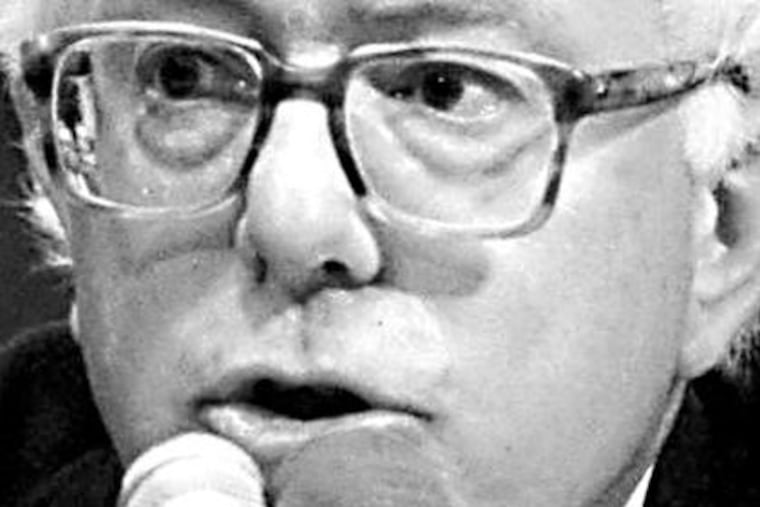Bill offers help in TV conversion
A coupon program would help free-TV viewers pay to replace or upgrade their analog antennas.

With the nation's transition to digital TV two months away, U.S. Sen. Bernard Sanders of Vermont has proposed a new government coupon program to subsidize rooftop antennas for people with poor reception.
The coupons will help defray the cost of antennas that could run into the hundreds of dollars for lower-income people and the elderly, who will be disproportionately affected by the pending digital switch. An option, given the cost of antennas, may be no TV, Sanders said.
"If you're 80 years old, you will not be going up on your roof in a Vermont winter," said Sanders, an Independent and former mayor of Burlington, Vt., who heard complaints about free-digital-TV reception in a Vermont town hall meeting in October.
The legislation, introduced Dec. 11, opens a new area of concern about the digital switch, as some believe that many people - potentially millions - could have to buy or upgrade TV antennas.
Broadcasters are required by law to switch to digital signals by Feb. 17, replacing analog technology used since the dawn of the TV age. Many broadcasters have begun the digital-switch process this year.
Early anecdotal information, and evidence from the digital transition in Britain, indicate millions of people with rabbit-ear antennas could lose one or more channels, said Barry Goodstadt, an independent consultant in the Washington area, formerly with research firm Centris.
The Federal Communications Commission has estimated that about 5 percent of the free-TV viewers - or roughly 750,000 households who rely solely on free TV - may need new antennas after the digital transition.
Goodstadt said the problem of poor reception is pronounced in hilly places like Vermont, Appalachia and parts of the Philadelphia area.
The total cost for an antenna and installation could reach $400, Sanders said, and his proposed $80 coupon would cover part of it. The Vermont senator would like the program included in an economic stimulus package. "This will create jobs," he said.
U.S. Rep. Rick Boucher (D., Va.) agrees that the coupon program should be part of a stimulus package, saying that his mountainous congressional district in western Virginia is a "poster child" for the antenna problem. Boucher learned of the reception issues with digital television after traveling to Britain in 2007.
About 15 percent of the antennas in the area of Britain that Boucher visited had to be replaced or upgraded after the digital switch, he said.
The proposed Sanders legislation reflects growing interest and concern in Washington over the digital-TV transition, which has been overshadowed by the auto bailout and recession.
Top Obama transition officials met this month with broadcasters to discuss the transition. Officials say they expect two million calls for help from consumers as the transition takes place in mid-February.
High-ranking Democrats, Sen. Jay Rockefeller of West Virginia and Rep. Henry Waxman of California, wrote Dec. 12 to FCC chairman Kevin Martin that he should focus the agency on the digital transition in the next two months.
Martin canceled Thursday's FCC meeting after receiving the letter that said, "Serious questions are being raised about transition readiness."
An estimated 15 million U.S. households, a group that is predominately older and lower-income, rely solely on free TV for entertainment and news, according to industry estimates.
Millions of other households with cable or satellite TV maintain secondary TVs in their homes on rabbit ears that will be affected by the digital switch.
People have requested from the federal government millions of $40 government coupons to purchase digital-converter boxes for older televisions to maintain free TV. The boxes convert the digital signal into a TV picture, but won't help with the over-the-air reception.
FCC spokesman Clyde Enslin said digital-TV coverage areas for local broadcast stations could be smaller, or larger, than the older analog-TV coverage areas. He recommended that people visit the Web site antennaweb.org for information.
Sanders' proposed legislation on the antennas also contains a provision for a $10-a-month no-frills cable or satellite-TV service for people who lose all access to free TV because of the digital switch. This is likely to happen in rural areas.
Sanders said he was concerned that Comcast Corp. and other pay-TV providers would raise rates quickly on customers gained on promotional rates during the digital transition.
Comcast, the nation's largest pay-TV company, said in October that it would voluntarily offer new cable-TV customers a special rate of $10 a month. Comcast officials did not have a comment on the proposed Sanders bill.
Dish Network Corp. is offering monthly $9.99 and $14.99 packages to consumers. New Dish customers will have to buy a satellite dish, which costs $149.
"It is the government forcing this transition," Sanders said. "I don't want to see people lose what they have. If you are an older person, the TV is a very important part of your life." He said he feared the transition could be a "major step backward" for some people.